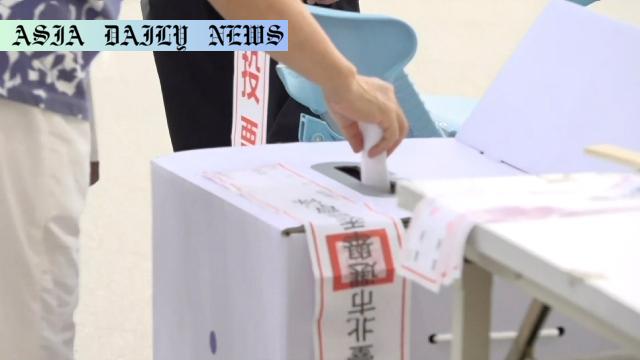Taiwan Recall Election: Voters assess recall for 24 KMT lawmakers amid allegations of Beijing ties.

Introduction: A Crucial Political Moment in Taiwan
Taiwan, a vibrant democracy in East Asia, is currently at the center of a heated political battle that could redefine its parliamentary structure. On Saturday, Taiwanese citizens participated in a recall election aimed at potentially removing 24 lawmakers from the largest opposition Kuomintang (KMT) party. This significant electoral event, which follows accusations of Beijing’s interference, has brought intense scrutiny and polarized public opinion across the island nation.
The Mechanics of the Recall Election
The recall process in Taiwan mandates that voters in specific districts decide whether their respective lawmakers should remain in office. To successfully recall a lawmaker, more votes in favor of the recall must outnumber those against, and the number of votes supporting the recall must constitute at least one-fourth of registered voters in the district. This dual requirement has made the recall process both stringent and dependent on active public participation. Voting concluded on Saturday at 4 p.m. local time, with counting of ballots currently underway.
The Broader Political Landscape
The recall initiative carries significant implications for Taiwan’s legislative body. The KMT currently holds 52 seats in Taiwan’s 113-member parliament, with the ruling Democratic Progressive Party (DPP) led by President Lai Ching-te holding a close 51 seats. If the recall is successful and the DPP manages to win at least six seats in subsequent by-elections, the political balance could tilt in favor of the ruling party, granting it a majority and greater leverage over legislative processes.
Allegations of Beijing’s Influence
A focal point of the recall election is the accusation by civic groups and the ruling DPP of Beijing’s influence over the KMT. Critics allege that KMT lawmakers have facilitated or supported China’s infiltration efforts, which aim to expand Beijing’s influence in Taiwan. Such concerns resonate heavily in Taiwan’s political discourse, given the historical tension between China and Taiwan and the island’s ongoing struggle to maintain its sovereignty and democratic institutions.
Opposition’s Response and Budget Cuts Controversy
The KMT has fiercely criticized the recall process, calling it a politically motivated move designed to deepen social divisions in Taiwan. Interestingly, KMT lawmakers, alongside another opposition party, have played a role in pushing for budget cuts, including a contentious reduction in defense spending. This policy position has further fueled the perception among critics that the KMT’s actions align with Beijing’s strategic interests, thereby adding to the political tension.
Conclusion: Taiwan’s Democratic Dilemma
The ongoing recall election epitomizes the complexities of Taiwan’s political dynamics. On one hand, it underscores the vitality of Taiwan’s democratic processes, showcasing the power of public participation in holding elected officials accountable. On the other hand, it raises critical questions about the extent of foreign influence and the challenges of ensuring a balanced and fair political system. The outcome of the recall election and subsequent by-elections will undoubtedly shape Taiwan’s political landscape in the near future, making this a transformative moment for the country.
Commentary
The Significance of Taiwan’s Recall Election
The recall election underway in Taiwan marks a pivotal moment in the country’s political history. While such a democratic process is a testament to Taiwan’s robust political framework, it also reveals the challenges inherent in reconciling opposing factions within a contentious political climate. This election serves as a battleground where allegations of external influence, concerns over sovereignty, and domestic policy disagreements converge.
The Allegations Against KMT Lawmakers
At the heart of the recall election is the accusation that KMT lawmakers have succumbed to Beijing’s influence. Such allegations are significant because they resonate deeply within the context of Taiwan’s history and its struggle for democratic self-governance. At a time when China has intensified its rhetoric and claims over Taiwan, the suspicion of internal actors facilitating foreign agendas inevitably heightens anxiety among citizens, particularly those wary of any erosion of Taiwan’s sovereignty.
The Democratic Progressive Party’s Strategy
For the ruling Democratic Progressive Party, the recall election represents an opportunity to secure a much-needed parliamentary majority. The DPP has struggled to push its legislative priorities due to the KMT’s influence in the legislature. By supporting the recall process, the DPP not only underscores its commitment to transparency but also signals its intent to address public grievances related to foreign influence and defense policies. However, this approach is not without risks, as it may further polarize the electorate and lead to accusations of opportunism.
The Broader Implications
Irrespective of the election’s outcome, the recall initiative underscores the pressing need for political cohesion in Taiwan. It highlights the complexities of balancing diverging interests and ideologies within a parliamentary framework. As Taiwan grapples with external and internal pressures, the election serves as a vivid reminder of both the strengths and vulnerabilities of its democracy.


